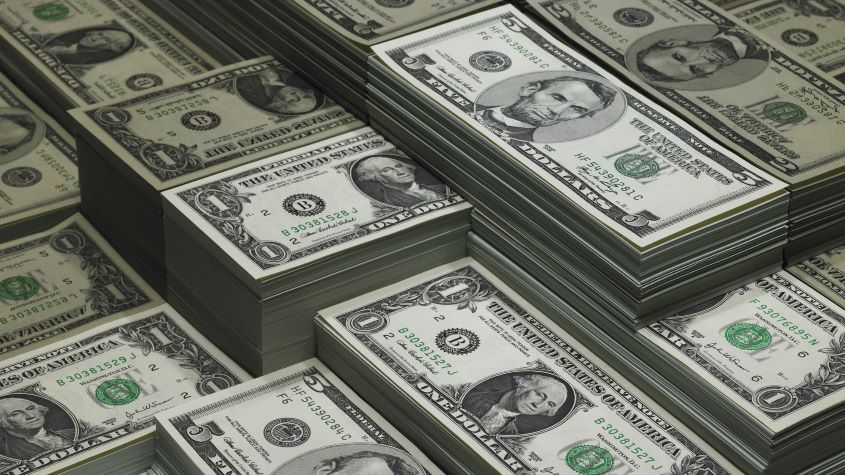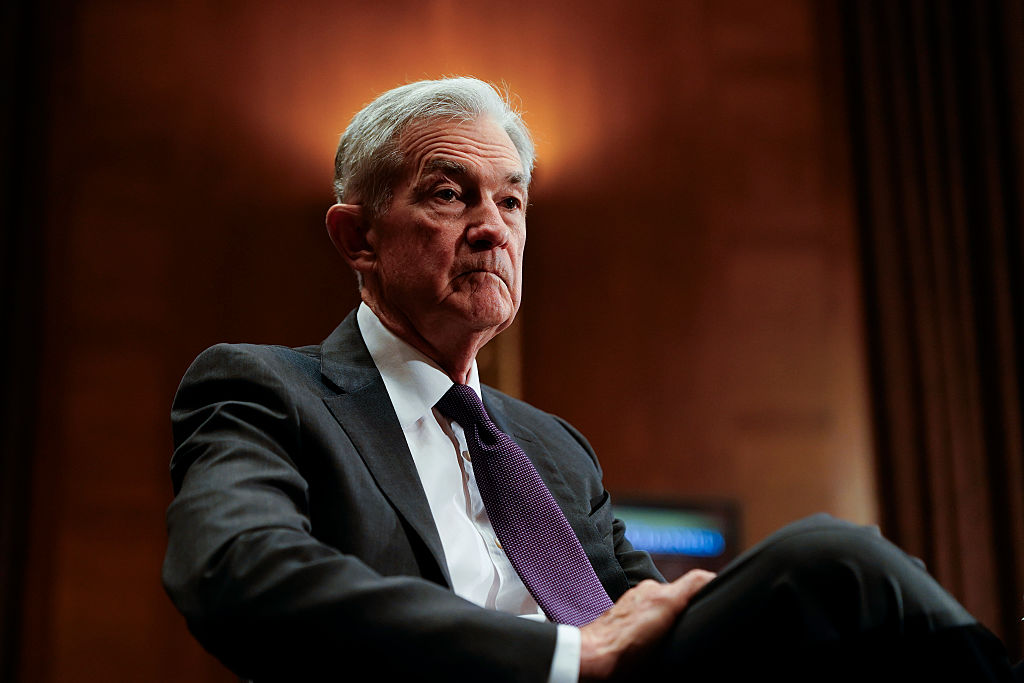
Get the latest financial news, insights and expert analysis from our award-winning MoneyWeek team, to help you understand what really matters when it comes to your finances.
You are now subscribed
Your newsletter sign-up was successful
Want to add more newsletters?

Twice daily
MoneyWeek
Get the latest financial news, insights and expert analysis from our award-winning MoneyWeek team, to help you understand what really matters when it comes to your finances.

Four times a week
Look After My Bills
Sign up to our free money-saving newsletter, filled with the latest news and expert advice to help you find the best tips and deals for managing your bills. Start saving today!
America’s debt ceiling debate shows we have reached a turning point. Trouble is, the authorities may not turn. They need to turn away from moneyprinting, deficits and expensive overseas meddling. Typically, the ruling class can’t do it.
These things increase their wealth and power; they don’t want to give them up. Instead, they use tricks, disguises and brute force to keep the racket going, all the way to the disastrous end. Will this time be different?
In the boom of 2009-2022, anything seemed possible. Money grew on trees. And the trees all got the Fed’s MiracleGro. It could be used to pay for pointless wars, investments that didn’t pay off, deficits, zombies – you name it.
MoneyWeek
Subscribe to MoneyWeek today and get your first six magazine issues absolutely FREE

Sign up to Money Morning
Don't miss the latest investment and personal finances news, market analysis, plus money-saving tips with our free twice-daily newsletter
Don't miss the latest investment and personal finances news, market analysis, plus money-saving tips with our free twice-daily newsletter
No more. Inflation changes everything. It raises prices. And higher prices make consumers unhappy and voters restless. The social fabric wrinkles... then rips.
The middle class bears the brunt. The poor have their inflation-adjusted handouts. The rich have their inflationboosted financial assets. The middle class has neither.
All it has is its time – which it sells by the hour. Inflation depreciates time. Long-term investments aren’t made. Long-term bonds get marked down. And real wages per hour have been falling for the last two years.
Meanwhile, inflation increases house prices. But a home is not a financial asset. Families can’t “cash out”; they have to live somewhere. All they can do is borrow against the “equity”.
And then they are trapped; they will need low interest rates to refinance – or lose their homes. In countries with severe inflation, the middle class gets squeezed so hard it vanishes.
In Venezuela, Argentina, Zimbabwe... as inflation rates went up, the middle class sank into poverty. That’s why democracy is incompatible with inflation.
The many poor are dependent on government handouts; they are easily bamboozled and bribed. And the elite get to be good at it. They become “extractive” – that is, they use their skills and power to make themselves rich at others’ expense.
An honest democracy needs a free, informed middle class. It needs a yeoman class – people who own their own farms and houses, pay the taxes, are ready to protect the homeland, and vote independently.
But what’s happening? Middle-class Americans remain the biggest income group by number of people, says Statista; but the same can’t be said of its income. From 1970 to 2021, the share of US aggregate income earned by the middle class shrank from 62% to 42%.
Over the same time, aggregate earnings by high-income Americans rose from 29% to 50%. The disappearance of the middle class corresponds with another of the great conceits we can no longer afford: an empire.
Almost two decades ago, we wrote a book with Addison Wiggin called Empire of Debt. It was a best-seller, written in 2005 when US debt was $13trn or 60% of GDP. Today, it’s $32trn, 120% of GDP.
The gist of our book is that though the US has been in the empire racket for more than a 100 years, it has never gotten the hang of it.
It extends its power and it offers protection to nations who obey, but war and sanctions to those who don’t. The trouble is, it loses the wars and loses money on the whole enterprise.
The idea of an empire is that you conquer and steal, and then demand tribute. It’s supposed to be at least self-financing, and usually profitable.
But the US stumbles and bumbles. It has the expense of conquering, then the expense of governing, and the extra cost of “building a democracy”. But where’s the pay-off? The booty? The tribute?
Get the latest financial news, insights and expert analysis from our award-winning MoneyWeek team, to help you understand what really matters when it comes to your finances.
MoneyWeek is written by a team of experienced and award-winning journalists, plus expert columnists. As well as daily digital news and features, MoneyWeek also publishes a weekly magazine, covering investing and personal finance. From share tips, pensions, gold to practical investment tips - we provide a round-up to help you make money and keep it.
-
 Can mining stocks deliver golden gains?
Can mining stocks deliver golden gains?With gold and silver prices having outperformed the stock markets last year, mining stocks can be an effective, if volatile, means of gaining exposure
-
 8 ways the ‘sandwich generation’ can protect wealth
8 ways the ‘sandwich generation’ can protect wealthPeople squeezed between caring for ageing parents and adult children or younger grandchildren – known as the ‘sandwich generation’ – are at risk of neglecting their own financial planning. Here’s how to protect yourself and your loved ones’ wealth.
-
 How a dovish Federal Reserve could affect you
How a dovish Federal Reserve could affect youTrump’s pick for the US Federal Reserve is not so much of a yes-man as his rival, but interest rates will still come down quickly, says Cris Sholto Heaton
-
 New Federal Reserve chair Kevin Warsh has his work cut out
New Federal Reserve chair Kevin Warsh has his work cut outOpinion Kevin Warsh must make it clear that he, not Trump, is in charge at the Fed. If he doesn't, the US dollar and Treasury bills sell-off will start all over again
-
 'Investors should brace for Trump’s great inflation'
'Investors should brace for Trump’s great inflation'Opinion Donald Trump's actions against Federal Reserve chair Jerome Powell will likely stoke rising prices. Investors should prepare for the worst, says Matthew Lynn
-
 'Governments are launching an assault on the independence of central banks'
'Governments are launching an assault on the independence of central banks'Opinion Say goodbye to the era of central bank orthodoxy and hello to the new era of central bank dependency, says Jeremy McKeown
-
 Will Donald Trump sack Jerome Powell, the Federal Reserve chief?
Will Donald Trump sack Jerome Powell, the Federal Reserve chief?It seems clear that Trump would like to sack Jerome Powell if he could only find a constitutional cause. Why, and what would it mean for financial markets?
-
 Can Donald Trump fire Jay Powell – and what do his threats mean for investors?
Can Donald Trump fire Jay Powell – and what do his threats mean for investors?Donald Trump has been vocal in his criticism of Jerome "Jay" Powell, chairman of the Federal Reserve. What do his threats to fire him mean for markets and investors?
-
 Do we need central banks, or is it time to privatise money?
Do we need central banks, or is it time to privatise money?Analysis Free banking is one alternative to central banks, but would switching to a radical new system be worth the risk?
-
 Will turmoil in the Middle East trigger inflation?
Will turmoil in the Middle East trigger inflation?The risk of an escalating Middle East crisis continues to rise. Markets appear to be dismissing the prospect. Here's how investors can protect themselves.

